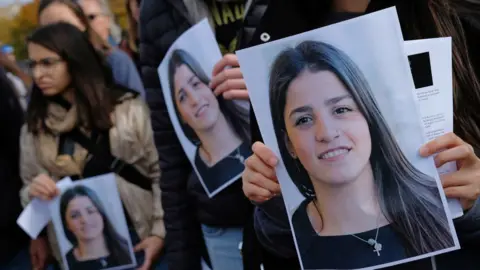Greek charges dropped for 24 who rescued migrants
 Getty Images
Getty ImagesA Greek court has rejected charges of espionage for a group of volunteers who were put on trial for rescuing migrants on the island of Lesbos.
But they are still being investigated for alleged human trafficking, money laundering and fraud.
The UN human rights office was among several bodies to criticise the trial.
Among the defendants is swimmer Sarah Mardini, whose story of helping fellow refugees cross the sea from Turkey to Greece inspired the film The Swimmers.
A year after arriving in Greece as a refugee from Syria, she volunteered at an NGO that provided assistance to migrants and refugees arriving on Greek shores.
Alongside other volunteers, Ms Mardini was detained in 2018 after the police said the NGO had provided direct assistance to organised trafficking groups.
Other members of the group of volunteers include experienced diver Sean Binder, from Ireland, volunteer lifeguard Nasos Karakitsos, from Greece, and retired Dutch national Pieter Wittenberg.
The charges the group faced at this week's trial involved espionage, illegal access to state communications, money laundering and assisting criminal activity.
The trial started on Tuesday at the Court of Appeal of Mytilini after four years of postponements.
The activists' lawyers had filed complaints about what they said were several procedural faults, including insufficient translation of prosecution documents, which the court admitted to when acquitting the volunteers.
Now, however, many of the activists face a separate investigation into charges of people smuggling, fraud, membership of a criminal organisation, and money laundering.
Ahead of the court's announcement on Friday, the UN Human Rights Office said that "trials like this are deeply concerning because they criminalise life-saving work and set a dangerous precedent", adding that "there has already been a chilling effect, with human rights defenders and humanitarian organisations forced to halt their human rights work in Greece and other EU countries."
A European Parliament report had previously labelled the trial as the "largest case of criminalisation of solidarity".
Amnesty International said the charges still facing Ms Mardini and Mr Binder were "baseless" and noted that, under Greek law, they carried a maximum sentence of 20 years.
Following the hearing, Mr Karakitsos told a Greek news outlet that he was "very angry": "We have lost four and a half years of our lives... And we will still be waiting, we don't know for how long, to see if and when the trial for the felonies starts. We are hostages and we don't know how much longer for."
Mr Binder said he would have preferred it if the case had gone to trial. "This isn't justice. Justice would have been a trial four years ago, where we would have been found innocent," he said.
"We don't get found not guilty, it's simply a procedural mistake," Mr Binder said.
Ms Mardini was not at the trial as she has been barred from returning to Greece and has followed proceedings from Germany, where she was granted asylum.
She and her sister Yusra fled Syria as refugees in 2015. While crossing the Aegean Sea, their dinghy's engine broke. They, along with two others who could swim, saved the lives of those on board by swimming alongside the dinghy.
